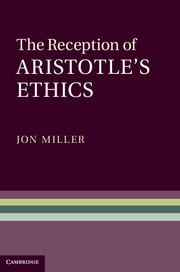Book contents
- The Reception of Aristotle's Ethics
- Contents
- Notes on contributors
- Acknowledgments
- A note on abbreviations and transliteration
- Introduction
- Chapter 1 The Nicomachean Ethics in Hellenistic philosophy
- Chapter 2 The transformation of Aristotle's ethics in Roman philosophy
- Chapter 3 Aristotelian ethics in Plotinus
- Chapter 4 St. Augustine's appropriation and transformation of Aristotelian eudaimonia
- Chapter 5 The Arabic and Islamic reception of the Nicomachean Ethics
- Chapter 6 Maimonides’ appropriation of Aristotle's ethics
- Chapter 7 The relation of prudence and synderesis to happiness in the medieval commentaries on Aristotle's ethics
- Chapter 8 Using Seneca to read Aristotle
- Chapter 9 Aristotle's Ethics in the Renaissance
- Chapter 10 The end of ends? Aristotelian themes in early modern ethics
- Chapter 11 Affective conflict and virtue
- Chapter 12 Kant and Aristotle on ethics
- Chapter 13 The fall and rise of Aristotelian ethics in Anglo-American moral philosophy
- Bibliography
- Index
Introduction
Published online by Cambridge University Press: 05 February 2013
- The Reception of Aristotle's Ethics
- Contents
- Notes on contributors
- Acknowledgments
- A note on abbreviations and transliteration
- Introduction
- Chapter 1 The Nicomachean Ethics in Hellenistic philosophy
- Chapter 2 The transformation of Aristotle's ethics in Roman philosophy
- Chapter 3 Aristotelian ethics in Plotinus
- Chapter 4 St. Augustine's appropriation and transformation of Aristotelian eudaimonia
- Chapter 5 The Arabic and Islamic reception of the Nicomachean Ethics
- Chapter 6 Maimonides’ appropriation of Aristotle's ethics
- Chapter 7 The relation of prudence and synderesis to happiness in the medieval commentaries on Aristotle's ethics
- Chapter 8 Using Seneca to read Aristotle
- Chapter 9 Aristotle's Ethics in the Renaissance
- Chapter 10 The end of ends? Aristotelian themes in early modern ethics
- Chapter 11 Affective conflict and virtue
- Chapter 12 Kant and Aristotle on ethics
- Chapter 13 The fall and rise of Aristotelian ethics in Anglo-American moral philosophy
- Bibliography
- Index
Summary
Aristotle's ethics are the most important in the history of Western philosophy. However, precisely how his ethics have mattered over the centuries has varied enormously. Additionally, present knowledge of Aristotle's influence on his successors ranges widely. There is much to be said about both the significance of Aristotle's ethics for his successors and the spectrum of effects they had on them. The essays collected in the present volume speak to precisely these issues.
In this brief introduction, I want to prepare readers for the essays by elaborating on the general orientation of the volume. I shall also explain the criteria used for selecting philosophers or philosophical eras to include in the book. Finally, I shall say a little about the contributors themselves. Something I will not attempt is a summary of the contents of the chapters. While the details will obviously vary, the basic thrust or main aim of the thirteen chapters is highly similar. I will present this common aim here and let readers go to the chapters for the details.
So let me begin with the general orientation of the volume. It aims to provide an account of Aristotle’s reception from ancient times to the near present. It does so by pairing Aristotle with thirteen of his successors. These successors vary from philosophical eras to individual philosophers. In all cases, the accounts given include Rezeptionsgeschichte and conceptual analysis. Since these terms can be interpreted differently, I should explain how they are used in the present instance.
- Type
- Chapter
- Information
- The Reception of Aristotle's Ethics , pp. 1 - 4Publisher: Cambridge University PressPrint publication year: 2012

